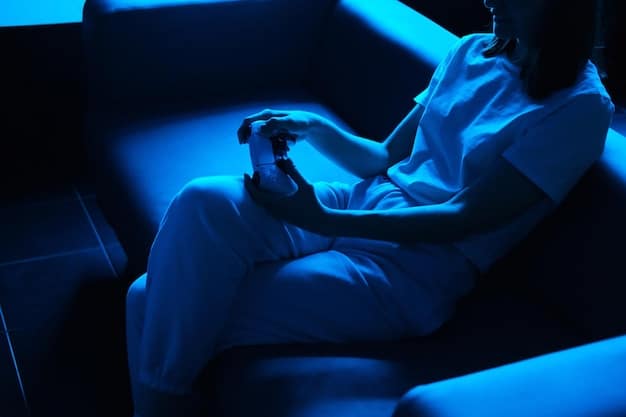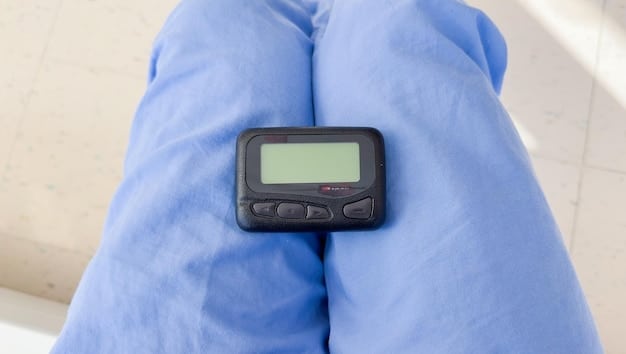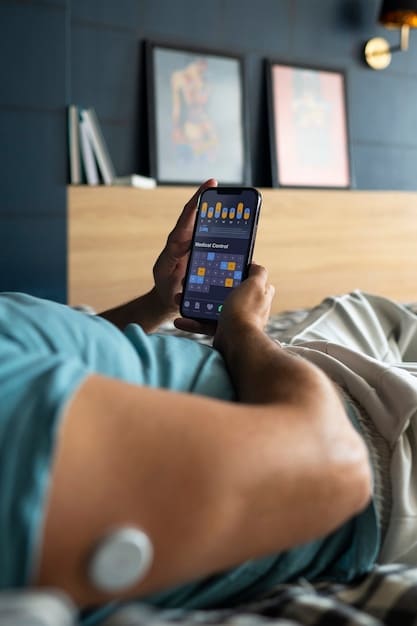The 3-Step Guide to Better Sleep with New Sleep Tech in 2025

The 3-Step Guide to Improving Sleep Quality by 30% Using New Sleep Technology in 2025 outlines a path to enhanced sleep through tech-driven solutions, focusing on personalized sleep tracking, smart environment adjustments, and optimized sleep schedules, potentially raising sleep quality by 30%.
Are you ready to unlock a more restful night and boost your overall well-being? This comprehensive guide, The 3-Step Guide to Improving Sleep Quality by 30% Using New Sleep Technology in 2025, explores cutting-edge technologies and actionable strategies to help you achieve just that.
Understand Your Sleep: The Foundation for Improvement
Improving sleep quality begins with understanding your current sleep patterns. New sleep technology in 2025 offers unparalleled insights into your sleep cycles, allowing for personalized adjustments to optimize your rest.
The Power of Sleep Trackers
Wearable sleep trackers have evolved significantly. They now offer detailed data beyond just tracking sleep duration. They analyze sleep stages, heart rate variability, and even breathing patterns.
Decoding Your Sleep Data
Understanding the metrics provided by your sleep tracker is crucial. REM sleep, deep sleep, and light sleep all play different roles in physical and mental restoration. Identifying deficiencies in any of these areas can guide targeted interventions.
- Track your sleep for at least a week to establish a baseline.
- Identify patterns in your sleep data, such as consistent wake-up times or frequent interruptions.
- Consult with a sleep specialist to interpret your data and receive personalized recommendations.
Leveraging sleep trackers and understanding the data they provide is the first crucial step to take control of your sleep in 2025.

Optimize Your Sleep Environment: Create a Sanctuary
Your sleep environment plays a significant role in the quality of your sleep. Creating a sleep sanctuary that is conducive to rest is essential for achieving a 30% improvement in sleep quality.
Smart Lighting and Temperature Control
Smart home technology offers advanced control over lighting and temperature. Blue light emitted from electronic devices can interfere with melatonin production, making it difficult to fall asleep. Smart lighting systems can automatically adjust the color temperature throughout the day, minimizing blue light exposure in the evening. Similarly, smart thermostats can maintain a consistent and optimal temperature in your bedroom throughout the night.
Soundscapes and Noise Reduction
Noise pollution can disrupt sleep and prevent you from reaching deeper sleep stages. Soundproofing your bedroom or using white noise machines can help to mask distracting sounds. Some new sleep technology even incorporates personalized soundscapes that adapt to your sleep cycles, promoting relaxation and deeper sleep.
- Invest in blackout curtains to block out external light.
- Use a white noise machine or fan to create a consistent background sound.
- Ensure your bedroom is at a comfortable temperature (typically between 60-67 degrees Fahrenheit).
Optimizing your sleep environment is key to getting quality sleep.
Personalize Your Sleep Schedule: Align with Your Circadian Rhythm
Your circadian rhythm, or internal body clock, influences your sleep-wake cycle. Aligning your sleep schedule with your natural circadian rhythm is crucial for improving sleep quality.
Utilize Smart Alarm Clocks
Smart alarm clocks go beyond simply waking you up at a set time. They use sleep tracking data to identify the optimal time to wake you within a specific window, based on your sleep stages. This minimizes grogginess and helps you to wake up feeling refreshed.
Consistency is Key
Maintaining a consistent sleep schedule, even on weekends, is essential for regulating your circadian rhythm. Irregular sleep patterns can disrupt your body’s natural clock, leading to difficulty falling asleep and waking up.

- Go to bed and wake up at the same time every day, even on weekends.
- Expose yourself to natural sunlight in the morning to help regulate your circadian rhythm.
- Avoid caffeine and alcohol before bed, as they can interfere with sleep.
Personalizing your sleep schedule requires a shift in thinking. To feel well rested, you need to work with, not against, your body’s natural sleep rhythm.
Advanced Sleep Technology Coming in 2025
The field of sleep technology is rapidly evolving. In 2025, expect to see even more sophisticated tools and techniques for improving sleep quality.
AI-Powered Sleep Coaching
Artificial intelligence is poised to play a significant role in personalized sleep coaching. AI algorithms can analyze vast amounts of sleep data to identify individual patterns and provide tailored recommendations for optimizing sleep. These AI coaches may be integrated into sleep trackers, smart home devices, or dedicated apps.
Brainwave Entrainment Technologies
Brainwave entrainment uses auditory or visual stimuli to guide your brainwaves into specific frequencies associated with relaxation and sleep. New technologies are emerging that deliver personalized brainwave entrainment programs based on your unique brainwave activity. These technologies can potentially deepen sleep and reduce sleep latency (the time it takes to fall asleep).
Personalized Sleep Soundscapes
While white noise machines are effective for some, they can be monotonous and irritating for others. In 2025, expect to see more sophisticated soundscapes that are personalized to your individual preferences and sleep patterns. These soundscapes may incorporate natural sounds, ambient music, and even binaural beats to promote relaxation and deeper sleep.
These advances promise to offer more precise and effective ways to address individual sleep issues.
Addressing Common Sleep Disruptors
Even with the best sleep technology and optimized sleep environments, certain factors can still disrupt your sleep. It’s important to address these underlying issues to achieve optimal sleep quality.
Managing Stress and Anxiety
Stress and anxiety are common causes of sleep disturbances. Practicing relaxation techniques, such as meditation or deep breathing exercises, can help to calm your mind before bed. Cognitive behavioral therapy (CBT) is also an effective treatment for insomnia and anxiety-related sleep problems.
Optimizing Your Diet
Your diet can significantly impact your sleep quality. Avoid heavy meals, caffeine, and alcohol before bed. Focus on consuming a balanced diet rich in fruits, vegetables, and whole grains. Certain foods, such as tart cherries and almonds, contain natural compounds that promote sleep.
Addressing Underlying Medical Conditions
In some cases, sleep problems may be a symptom of an underlying medical condition, such as sleep apnea, restless legs syndrome, or chronic pain. It’s important to consult with a healthcare provider to rule out any underlying medical issues and receive appropriate treatment.
By addressing and resolving these common issues, you improve your sleep.
Integrating New Sleep Technology Responsibly
While new sleep technology offers tremendous potential for improving sleep quality, it’s important to use it responsibly and avoid relying on it as a quick fix.
Prioritize Healthy Sleep Habits
New sleep technology should be used as a tool to support healthy sleep habits, not to replace them. Focus on establishing a consistent sleep schedule, creating a relaxing bedtime routine, and optimizing your sleep environment. Technology can then be used to fine-tune your sleep and address specific issues.
Be Mindful of Data Privacy
Sleep trackers collect sensitive data about your sleep patterns and health. It’s important to choose reputable devices and apps that prioritize data privacy and security. Be sure to read the privacy policies carefully and understand how your data will be used.
Consult With Professionals
If you are experiencing persistent sleep problems, it’s important to consult with a sleep specialist or healthcare provider. They can help you to identify any underlying issues and develop a personalized treatment plan.
Balance should be a top priority.
| Key Point | Brief Description |
|---|---|
| 😴 Sleep Tracking | Understand sleep patterns with detailed data from new sleep tech. |
| 💡 Sleep Environment | Optimize room conditions with smart lighting and sound reduction. |
| ⏰ Sleep Schedule | Align with your circadian rhythm with smart alarms. |
| 🧠 AI Coaching | Get personalized recommendations via AI-powered sleep coaching. |
Frequently Asked Questions
▼
Sleep trackers monitor sleep stages, heart rate, and movement, providing data about your sleep patterns, which is helpful to identify areas for improvement and optimize your bedtime routine for better sleep quality.
▼
The ideal bedroom temperature for optimal sleep is typically between 60-67 degrees Fahrenheit (15-19 degrees Celsius). This cooler temperature helps regulate your body’s core temperature, promoting relaxation and deeper sleep.
▼
Regular sleep improves overall health by helping improve mood, enhancing immune function, boosting cognitive performance, and improving physical health. Quality sleep is key to performing well on a daily basis and a long, healthier life.
▼
Light plays an important role in regulating your sleep by influencing the production of melatonin, a hormone that promotes sleepiness. Exposure to blue light before bed interferes with the production of melatonin, making it harder to fall asleep.
▼
AI uses algorithms to analyze sleep data, offering personalized recommendations, optimizing sleep schedules, and customizing sleep environments. This technology can drastically improve your ability to achieve a restful night and feel well rested.
Conclusion
Improving sleep quality is fundamental to overall well-being, and leveraging new sleep technology presents a promising avenue for achieving a 30% improvement in sleep quality by 2025. By understanding your sleep patterns, optimizing your environment, and personalizing your schedule, and staying informed about technological advances, you can unlock the power of restful sleep and enjoy the myriad benefits it offers.





